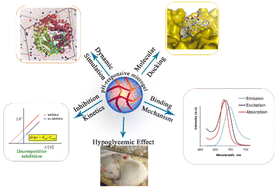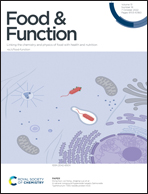Control of eriocitrin release from pH-sensitive gelatin-based microgels to inhibit α-glucosidase: an experimental and computational study
Abstract
α-Glucosidase is among the intestinal epithelial enzymes that produce absorbable glucose in the final stage of glycan catabolism. It leads to an increase in blood glucose levels as a result of high glucose uptake in diabetic patients. However, inhibition of this essential biochemical process can be a useful therapeutic approach to diabetes mellitus (DM). Eriocitrin (ER) is an abundant “flavanone glycoside” in citrus fruits with rich antioxidant properties whose effects on α-Glu inhibition in the small intestine remain to be determined. Herein, pH-sensitive microgels (MGs) were designed based on cross-linked methacrylate with acrylamide (AM) and acrylic acid (AAc) (molar ratio 70 : 30 of AAc : AM) as a controlled release system for sustained delivery of ER into the small intestine. The presence of amide and acrylate in MGs and the mechanical resistance were determined using FT-IR spectroscopy, rheology, and viscoelastometry. In vitro experiments showed that MGs could protect ER against diffusion in the gastric location and adjust its release in the intestinal milieu. The intestinal α-Glu activity was inhibited by ER (IC50 value of 12.50 ± 0.73 μM) in an uncompetitive dose-dependent manner. The presence of ER altered the structure of α-Glu and reduced the hydrophobic pockets of the enzyme. Molecular docking analysis along with molecular dynamics simulation displayed that ER-α-Glu formation is directed by hydrogen binding with Asp69, Asp215, Glu411, Asp307, and Tyr347 residues. Moreover, in vivo assessment showed that rat blood glucose concentration decreased after ER administration compared with the control group. The results highlight that ER-loaded-MGs can be considered as a useful releasing strategy in treating DM via α-Glu inhibition.



 Please wait while we load your content...
Please wait while we load your content...